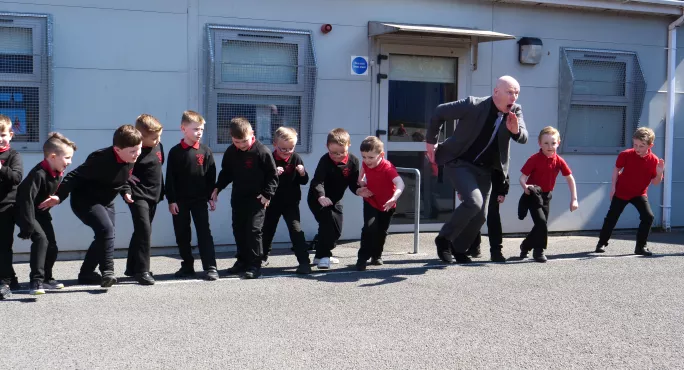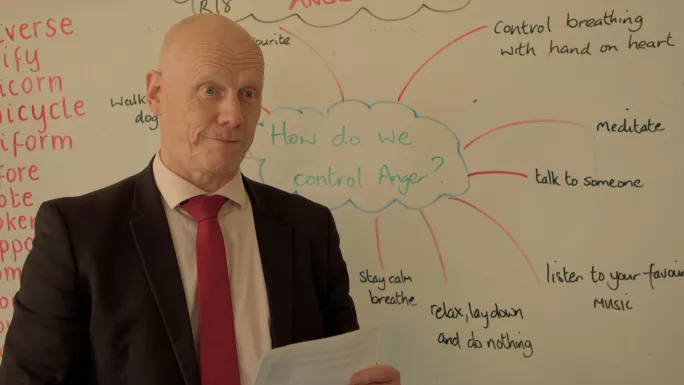- Home
- Leadership
- Strategy
- 10 questions with... Kevin McArevey
10 questions with... Kevin McArevey

Kevin McArevey, headteacher at Holy Cross Boys’ Primary School in Belfast, is the subject of a new documentary film, Young Plato.
The film shows how - in part by sharing his passion for the wisdom of ancient Greek philosophers - he has made a profound difference to primary pupils in a marginalised, working-class community that has for generations been plagued by poverty, drugs and violence.
He tells us about introducing philosophy to primary pupils and sceptical colleagues, how Socratic questions can improve behaviour and why humility is essential in a school leader.
1. What I wish I’d known when I started teaching
The positive influence philosophy can have on primary school children to encourage reflection, reasoning, responsiveness and reevaluation in a critical and creative way to answer big questions of, “What is the purpose of life?” and “What does it mean to be human?”
These questions and many more are important and should be tackled in a forum that allows for collaboration, caring, thinking and self-regulation.
2. The most important qualities a school leader and a teacher need are...
I use “heart” as an acronym for qualities that are also needed in all walks of life. A teacher needs both humility and humour to be able to connect with staff, parents and students. You will see these qualities in all successful leaders alongside empathy, enthusiasm and effective communication and listening.
Then ambition opens the door to continual professional development, which leads to developing and challenging yourself and others. The ability to relate to others brings into play your emotional intelligence, and naturally leads to teamwork, trust and time management, which are so important for your mental health and wellbeing.
3. The most important lessons I’ve learned from doing this job are...
The underlying theme of any educational programme is to raise the standards and achievements of the whole school community. Consequently, your school should be a community school and not just a school in the community - so that no child is left behind.
4. The best change I ever made in my school was...
The introduction of thinking skills from the readings of Barrie Bennett, Geoff Petty, John Hattie and Edward de Bono. All of these researchers have broadened the thinking and minds of a whole school community, which primarily led to the introduction of philosophy. As the quote attributed to St Thomas Aquinas has it: ”The things that we love tell us what we are.”
5. If I could change something about education it would be...
To introduce philosophy as a module to be taught to students in teacher-training colleges, so that young teachers will develop as highly effective questioners and bring the art of thinking to children from nursery to post-primary. It’s a vision that is attainable and needs schools to make it a part of their school development plan.
Philosophy is not to be a bolt-on part of the curriculum, but rather something that should permeate and be embedded into the school curriculum. Teachers should want children to improve their thinking as a habit, in line with the thinking of Aristotle.
- Related: Why philosophy with children is worth it
- Positive outlook: Teachers should know how deeply appreciated they are
- Quick read: One teacher on the long-lasting impact of philosophy in primary school
6. My most memorable moment as a school leader/teacher was...
Coming back to school, on a Monday, from London after a weekend course with The Philosophy Foundation and organising a meeting with our Foundation and key stage 1 teachers and assistants. I told them that our children were going to do philosophy today, and the teachers or assistants could not contain their laughter or jocularity.
I took a Primary 2 class for a metaphysical-based philosophy session on existence with a simple doughnut, and I had all of the observing teachers and pupils in the palm of my hand. The boys’ answers to my questions were simply mesmerising and teachers and teaching assistants alike said: “I didn’t know they could think like that!”
That’s when we had a paradigm shift in Holy Cross Boys’ Primary School - it’s been a lot of hard work, but we are now a very proud school of philosophy.
7. The worst mistake I ever made was...
Not including the teaching assistants (TAs) in the philosophy training whenever Pete Worley and Steve Hoggins from The Philosophy Foundation came to our school. As the majority of our TAs are local, they have their finger on the pulse of the school community and I wanted to educate the whole community in philosophy.
I immediately changed that and brought Pete and Steve back to train the TAs and that to me was a key factor to securing a community buy-in for philosophy to flourish. We now have a TA philosophy session every Thursday morning and a parents’ philosophy class for an hour and a half on a Tuesday evening.

8. My top tip for aspiring school leaders/teachers is...
Don’t fear failure - if we don’t go outside our comfort zone then we will not rise and thrive. So swallow that failure and learn.
9. When dealing with challenging pupils, my go-to strategy is...
The Philosophy Board - a simple board that is outside my office. When the boys are involved in an altercation they will have a philosophical discussion on it outside my office. They will write about what happened and what should have happened. What should they do now? And it will finish with a Socratic question of “what is...?” In most cases, it will be “what is a friend?”
Philosophy is thinking about thinking, as Plato put it, and so the pupils engage in a reflective way after a reflexive action. The pupils all have a TTR (think, think, respond) book, which they take home each night. So they might be asked to engage philosophically with their parents about why they became a challenging pupil today.
10. The best CPD I ever did was...
With The Philosophy Foundation, on effective questioning. We looked at what is the best philosophy question to ask: it was found to be, one that is grammatically closed and conceptually open. For example, do aliens exist? This might elicit a one-word answer (grammatically closed) - yes, no, maybe - but it also opens things up and is both contestable and debatable (conceptually open).
After this wonderful CPD from Pete, we produced a poster for all teachers so that the children could benefit from this sort of skilled questioning during their lessons.
Young Plato is released in UK cinemas from Friday 11 March. Read more about the film here and watch the trailer here
You need a Tes subscription to read this article
Subscribe now to read this article and get other subscriber-only content:
- Unlimited access to all Tes magazine content
- Exclusive subscriber-only stories
- Award-winning email newsletters
Already a subscriber? Log in
You need a subscription to read this article
Subscribe now to read this article and get other subscriber-only content, including:
- Unlimited access to all Tes magazine content
- Exclusive subscriber-only stories
- Award-winning email newsletters



